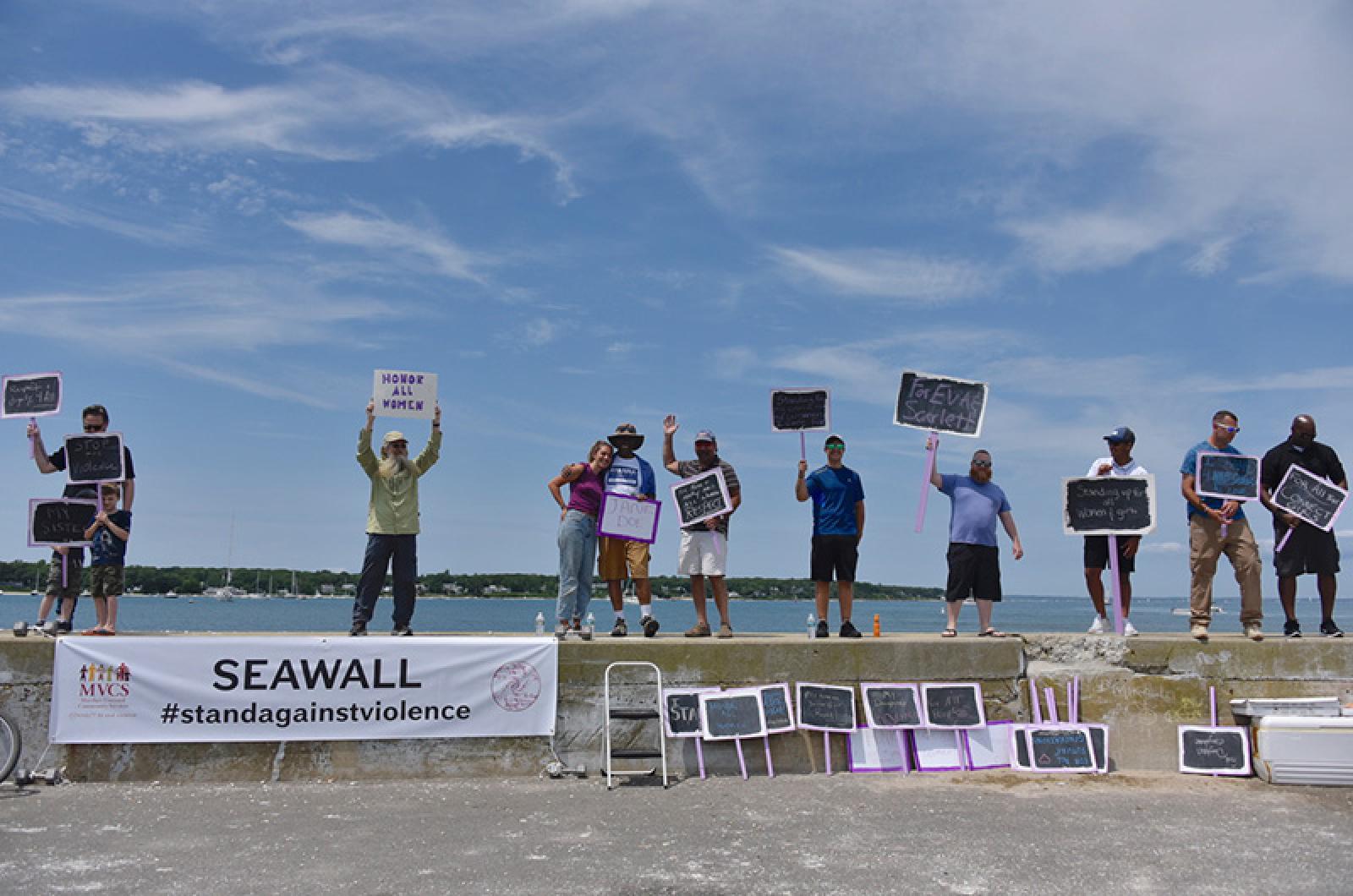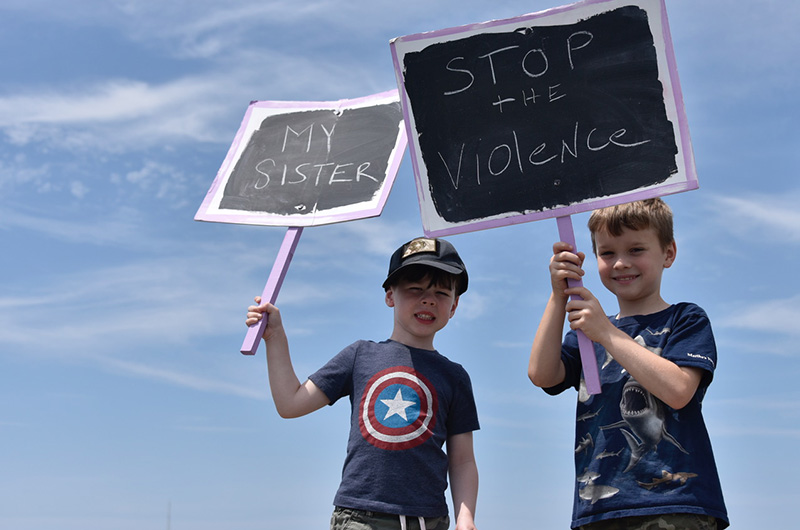Asked about the hundreds of domestic disturbance complaints they respond to each year, Island police were in agreement: it’s not an easy call.
“As far as emotional involvement when you go to a call, domestics, I think, are the hardest,” said Officer Zach Townes of Edgartown.
Police said the calls happen at all times of day. They come from people who are struggling financially and from people who live in massive homes. They come from vacationers, Islanders, and sometimes from personal acquaintances.
Police in Island towns work closely with each other and other services including Connect to End Violence, the Island’s rape crisis and domestic violence response center, to follow up with those affected and extend the intervention beyond the emergency response call.
“You don’t realize how prevalent it is. It’s kind of out of sight, out of mind,” said Mr. Townes, who volunteered with Connect to End Violence before he joined the Edgartown police department in 2015. “You can see charges in the paper and stuff, but you don’t get the full view of it until you hear it on the radio, not on a nightly basis, but close to it.”
In Edgartown, there have been more than 70 domestic-related calls this year so far, in Tisbury, 53, and in Oak Bluffs, 100, though totals can be difficult to track and compare due to discrepancies in categorization, which can include but are not limited to restraining order violations, domestic disturbances, and arrests for physical abuse. Up-Island, the totals are lower, but domestic disturbances still figure prominently in police work there too, officers said.
Thanks in part to Connect to End Violence, a program of Martha’s Vineyard Community Services, many Island officers have been trained to respond to domestic situations in a way that is trauma-informed. They understand, for example, that a victim may call the police for help and then tell them all is well when they come to the door minutes later.
“It’s understanding the complexities of domestic violence and that relationship and power and control,” said Connect to End Violence program director Jennifer Neary, regarding the dynamic between abuser and victim. “[It’s] understanding how, when someone calls for help with domestic violence, when that help arrives, because of survival or fear, that can kind of change.”
Police representatives meet with Connect to End Violence staff monthly to discuss best practices and to coordinate services. Without disclosing personal information, they sometimes use the gatherings to rehash police interventions and discuss what could have been done better, Ms. Neary said.
When a domestic call comes in, police respond in groups of at least two, officers explained at a roundtable with the Gazette this week. With the help of the 911 dispatcher, they try to understand as much information as possible about the situation before they make their presence known. They often turn sirens and lights off before entering the neighborhood and approach the house on foot. They listen from outside to try and gain more information.
Sometimes the victim comes to the door; sometimes it’s the abuser. Sometimes no one answers the door and police have to enter on their own. They then separate everyone involved and interview them individually. It’s often a complicated situation with a deep backstory.
“We try to figure out what took place as best we can, and then depending on what happened, we try to take appropriate action,” Mr. Townes said. If there has been physical abuse, police make an arrest. But often it is hard to know exactly what transpired.
“Usually it’s a lot more complex,” Mr. Townes said, “if there are kids in the house, or if it’s a situation where it’s not so clear what happened, or if it’s a situation where you’ve been to the house before and you know that someone might be a little bit fearful of their attacker so they won’t tell you what’s going on.”
Connect to End Violence has prepared packets for police to give to victims to outline resources and contact information and define what relationship violence looks like, regardless of whether an arrest is made. The packets are in both English and Portuguese, and provide the Connect crisis hotline phone number as well as contact for Connect’s lead core advocate and police liaison, Isadora Brito.
“If law enforcement responds to a call and the victim and the perpetrator say nothing happened, and police have nothing to act on, they can still leave that packet,” Ms. Neary said. “Then maybe in five months, maybe in five hours, the victim may look at it. That’s what we hope; if they’re not ready then, they may respond later.”
If an arrest is made, and a victim wants to seek an emergency restraining order outside of court hours, police can bring the victim to the station and call an on-call judge. An on-call staff member from Connect can come to the station to sit with the victim while paperwork is filled out.
After the incident, support continues. Officers make at least one follow-up call with victims. Sgt. Garrison Vieira of West Tisbury said he still intermittently checks on a victim from a domestic call he responded to three years ago.
“It’s to call and check in with them, say hi to them,” he said. “It’s the right thing to do.”
Ms. Brito, who is fluent in English and Brazilian Portuguese, is in constant communication with police and staff at the courthouse throughout the week. Like all staff at Connect, she is a trained domestic violence and rape crisis counselor, and meets victims at the courthouse to support them if they are seeking a restraining order or taking other legal action.
Police also communicate with school resource officers to notify them if children were involved in a domestic incident. In Edgartown, Officer Stephanie Immelt is always informed if an Edgartown school student was present during a domestic call. Bound by confidentiality restrictions, she can’t share particulars with school staff, but she can indicate that a child might need more attention.
“It could be that something happened in the morning, so we know [the child] didn’t get any breakfast. Or it happened late at night, so we know they didn’t get much sleep,” Ms. Immelt said. “We can ask if they need food or breakfast or if they need to take a nap in the nurse’s office.”
And, given the small nature of the Island community, police said they often see people from domestic calls in other contexts.
“You’re out to dinner and they’re sitting next to you at a table or you’ll see parents at the school,” Mr. Townes said.
“I take a lot of pride in helping people, especially in Aquinnah,” said Sgt. Paul Manning. “Being from Aquinnah I know 90 per cent of the community there.”
Sometimes, they said, they run into a survivor after some time has passed.
“There’s been times when we show up and we do what we can, and I am able to see that person down the road, and they’re in a much better place,” Mr. Townes said. “It’s very rewarding.”
For help with a domestic violence situation, Connect to End Violence counselors are available 24 hours a day through their crisis hotline: 508-696-7233 (SAFE). All services are free and confidential.
Second in a series.
The Gazette annual subscription promotion this year will benefit Connect to End Violence.








Comments (1)
Comments
Comment policy »